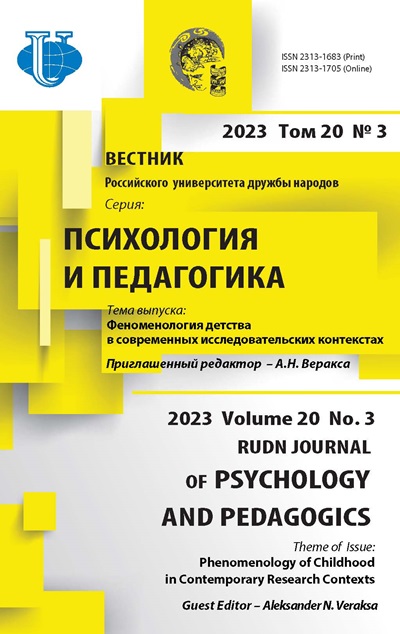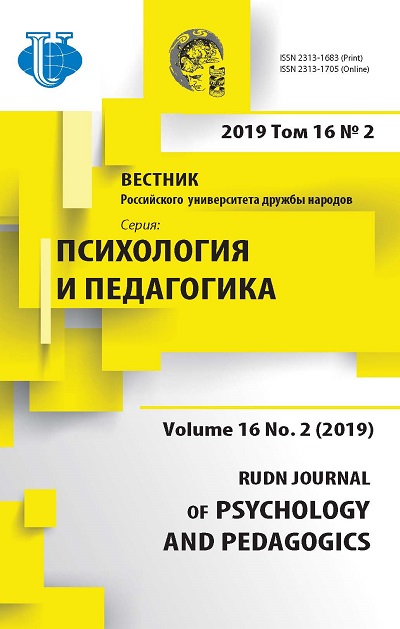Psi Chi: 10 Years of International Opportunities for Psychology Students and Researchers
- Authors: Cramblet Alvarez L.D.1, Domenech Rodríguez M.M.2, Zlokovich M.S.3
-
Affiliations:
- Adams State University
- Utah State University
- Psi Chi, the International Honor Society in Psychology
- Issue: Vol 16, No 2 (2019)
- Pages: 270-274
- Section: CROSS-NATIONAL SCIENTIFIC COOPERATION: ON 10TH ANNIVERSARY OF PSI CHI INTERNATIONALIZATION
- URL: https://journals.rudn.ru/psychology-pedagogics/article/view/21379
- DOI: https://doi.org/10.22363/2313-1683-2019-16-2-270-274
Cite item
Full Text
Abstract
-
Full Text
As the current Chair of Psi Chi’s International Advisory Committee (IAC), President of the Board of Directors, and the Executive Director of Psi Chi, we are excited to celebrate the 10th anniversary of the internationalization of this organization and to have the opportunity to help shape its future globally. Although Psi Chi has had an international flavor since its beginning, having been founded at the 9th International Congress of Psychology in 1929, the organization has been especially focused on international connections over the last 15 years. The Board formed a Promotional/International Committee in 1992, and that transformed into the International Task Force, International Committee, and International Advisory Board before finally becoming the IAC by 2011. That year the IAC set a vision for the future: Psi Chi will become recognized globally as a premier international honor society, and the premier international honor society in psychology. Expansion of Psi Chi chapters and opportunities to universities across the world will support the Society’s purpose “to encourage, stimulate, and maintain excellence in scholarship of the individual members in all fields, particularly in psychology, and to advance the science of psychology”. At the same time, the IAC set goals for Psi Chi’s international growth, which aimed to increase Psi Chi’s visibility and membership worldwide, develop international opportunities for members, and cultivate relationships among current and alumni Psi Chi members across the globe. A particularly excellent example of one of those goals coming to fruition is the Network for International Collaborative Exchange (NICE) (https://osf.io/juupx/). Executive Director, Martha Zlokovich conceived this initiative in 2016. She, Research Director John Edlund, Diversity Director Susy Gallor, Journal Editor Debi Brannan, and then-President Jon Grahe collaborated to develop the idea further. In February of 2017 the Research Advisory Committee (RAC) took ownership of developing the details and named the initiative NICE. RAC members Rick Miller, Susy Gallor, and Jon Grahe co-chaired a subcommittee of the RAC, formed to bring the initiative to fruition. They extended an international call to potential collaborators - 109 responded, mostly from the U.S., but also one person each from China, Italy, Mexico, and Nigeria. They invited all 109 researchers to apply for NICE Committee Chair. John Edlund, Susy Gallor, Jon Grahe, and Martha Zlokovich selected graduate student Kelly Cuccolo and Jon Grahe agreed to serve as mentor. Kelly, Jon, and Martha attended APA convention August 2017 to launch NICE during a Psi Chi session in the Division 52 (International Psychology) suite program. By that time NICE had grown into an initiative leveraging the power of crowdsourcing research and the technological advances that have accompanied the open science movement. Specifically, we use the Open Science Framework (OSF) as the platform for international collaboration. NICE offers two components, NICE: Crowd and NICE: Connect, both of which are unique examples of collaborative initiatives in an increasingly global world. Crowd is a crowdsourcing opportunity, currently completing the first approved research proposal, Understanding Family Dynamics in a Cross-Cultural Sample proposed by Mary Moussa Rogers and Cliff McKinney of Mississippi State University (https:// osf.io/qba7v/). Contributors follow a prescribed protocol collecting data from their home institutions, with the ultimate goal of achieving a diverse, international sample. Twentysix contributors from seven countries (China, Iran, Nigeria, Switzerland, Turkey, United Kingdom, and United States) and one U.S. territory (Guam) have obtained data from over 4200 respondents so far (closing June 30, 2019). The second component, NICE: Connect, aims to facilitate the growth of a community of cross-cultural researchers. Using the OSF StudySwap as a platform, researchers build collaborative relationships with others interested in cross-cultural study. Not only do these components facilitate international collaborations, but they also advance Psi Chi’s Vision 2020 goal of encouraging members in scholarly pursuits. Over the 10 years since Psi Chi became an international organization, Martha Zlokovich has worked with university faculty across the world, encouraging them to apply for a chapter (local university student and faculty group) and helping them to complete the online process. Today Psi Chi has 23 chapters outside the U.S. in 12 countries and 3 U.S. territories - including one in Russian Federation (RUDN University). Like NICE, this process has been one of mutual influence. Learning about how psychology is taught in other countries, for example, has resulted in changes to Psi Chi’s requirements for a chartering chapter, conference presentation collaborations involving U.S. and international chapter faculty, and opportunities for U.S. and international chapter members to “meet” one another via online platforms. The IAC is looking to next steps in continuing to enhance international research collaborations and cultural exchanges. We are currently working to support international travel for faculty and student exchanges between our сhapters. In an increasingly global world, it is important study not just cultural differences and similarities, but also to expand our understanding by experiencing them first-hand. Moreover, the APA guidelines for the undergraduate major recommend that students “adopt values that build community at local, national, and global levels” (APA, 2013). Travel provides students with an international perspective and assists in the development of empathy and acceptance of difference (Yuksul & Nascimento, 2018). Making travel more accessible through partnerships both domestically, and with our ever-growing network of chapters internationally, is one way we hope to see Psi Chi grow its international presence. A short-term goal in this area is to provide a clearinghouse via the Psi Chi website to connect students with programs open to them at other schools. For faculty members at a school that does not have a study abroad program, it would very helpful to have a place to connect their students to travel opportunities available through other universities. Supporting international travel, perhaps also through cross-institutional Psi Chi chapter connections, is a topic the Board will discuss at this summer’s meeting. Research and scholarship in psychology has been fairly criticized for being WEIRD (Western, Educated, Industrialized, Rich, Democratic) (Henrich, Heine, & Norenzayan, 2010). Psi Chi is an organization whose primary mission is to advance scholarship in psychology. As such, Psi Chi is well positioned to build a community of scholars that is truly global. In doing so, we have the opportunity to transform our members and the field of psychology. We are excited to celebrate the milestone of ten years as an international organization and we look forward to the opportunities ahead.
About the authors
Leslie D. Cramblet Alvarez
Adams State University
Author for correspondence.
Email: lcramblet@adams.edu
Ph.D., is a Professor of Psychology and the Founding Director of the Center for Teaching, Innovation, & Research at Adams State University in Alamosa, Colorado (Alamosa, Colorado, USA). She served as a Faculty Advisor for Psi Chi at Northern Arizona University and chartered the Adams State Chapter where she has been the Faculty Advisor for 12 years. She is currently the Psi Chi Vice-President for the Rocky Mountain Region and the Chair of the International Advisory Committee.
208 Edgemont Blvd, Alamosa, Colorado, 81102, United States of AmericaMelanie M. Domenech Rodríguez
Utah State University
Email: Melanie.Domenech@usu.edu
Ph.D., is a Professor of Psychology at Utah State University (Logan, USA). Her research, teaching, consultation, and clinical activities are focused on advancing diversity and inclusion broadly. Her research focuses on cultural competence, cultural adaptations of evidence-based interventions, and parenting training in Latinx families. Dr. Domenech Rodríguez served as Faculty Advisor for the Utah State University Chapter of Psi Chi (2002-2015), Rocky Mountain Regional Vice-President (2005-2009), Editor of Psi Chi Journal of Psychological Research (2012-2016), and President of the Board of Directors (2018-2019).
2810 Old Main Hill, Logan UT, 84322-2810, United States of AmericaMartha S. Zlokovich
Psi Chi, the International Honor Society in Psychology
Email: Martha.Zlokovich@psichi.org
Ph.D., is Executive Director (ED) of Psi Chi, the International Honor Society in Psychology (Chattanooga, USA). Before her current position as ED, she was Professor of Psychology and Psychology Department Chair at Southeast Missouri State University. She is a Developmental Psychologist whose research focuses on adolescent and emerging adult sexuality and contraception, scholarship of teaching and learning (SOTL), and college student study habits and persistence to graduation. She was Faculty Advisor of the Psi Chi Chapter at Southeast Missouri State University (1993-2008) and elected to serve on the Psi Chi Board of Directors as Midwestern Vice President (1999-2000), President-Elect, President (2003-2004), and Past President.
651 E. 4th St., Suite 600, Chattanooga, TN, 37403, United States of AmericaReferences
- American Psychological Association. (2013). APA guidelines for the undergraduate psychology major: Version 2.0. Washington, DC: Author. Retrieved from: http://www.apa.org/ed/precollege/about/ psymajor-guidelines.pdf
- Henrich, J., Heine, S.J., & Norenzayan, A. (2010). The weirdest people in the world? Behavioral and Brain Sciences, 33, 61-83. https://doi.org/10.1017/S0140525X0999152X
- Yuksul, P., & Nascimento, F. (2018). Breaking barriers: Developing faculty-led international trips for underserved students. Scholarship of Teaching and Learning in Psychology, 4(3), 189-197. http:// dx.doi.org/10.1037/stl0000120
















